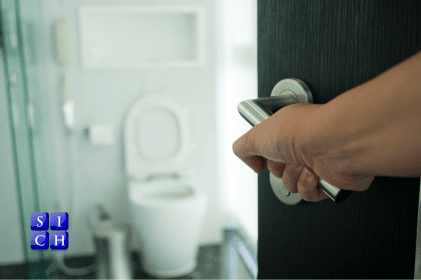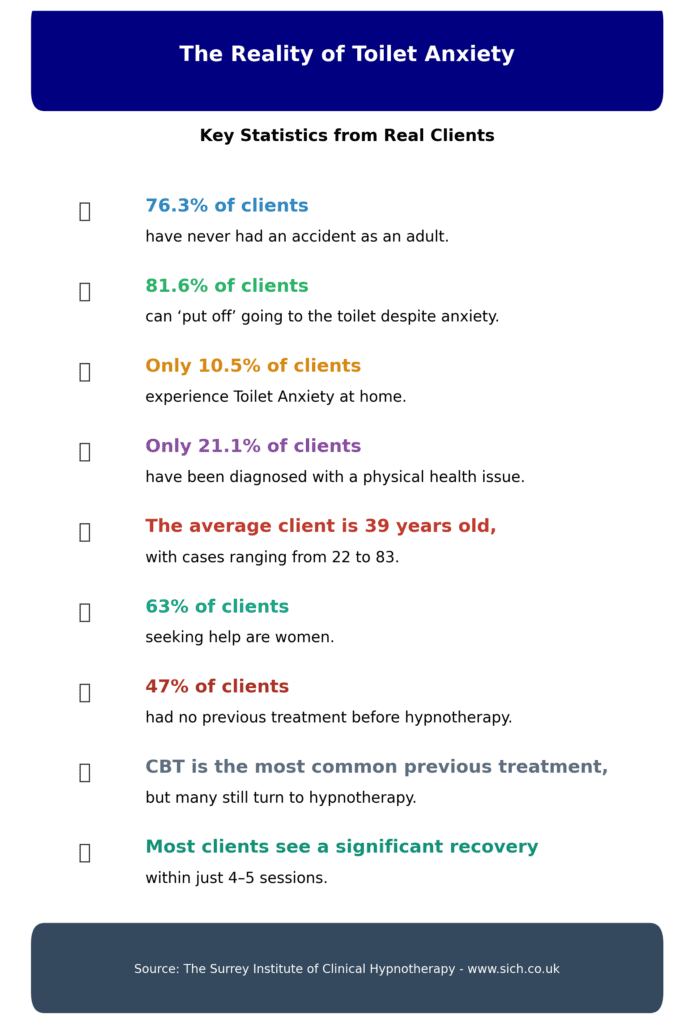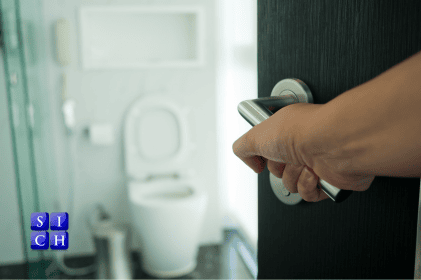Our clients are always surprised that there are so many people that live with toilet anxiety every day.
This particular fear is often mistakenly identified and interpreted as anxiety about pooping (parcopresis) or bowel and bladder anxiety (incontinence anxiety). While there may be some overlap, they are very different and more importantly, need to be treated in a different way.

In this article, we aim to give you a deeper understanding of toilet anxiety, helping you determine if you or someone you know may be experiencing this condition and how to fight toilet anxiety so you can live without this debilitating fear.
Table of Contents
What causes toilet anxiety?
Toilet anxiety refers to the fear of needing the toilet, but more specifically, the fear that you won’t be able to reach the toilet in time. Interestingly, this anxiety often doesn’t occur when you’re at home unless there’s a perceived issue, such as having only one bathroom and someone else is using it. This distinction is common in those who struggle to fight toilet anxiety in public settings.
This type of debilitating fear can affect anyone, regardless of age. Although it often takes root during childhood, it can also emerge in adulthood through experiences that make a person anxious about needing the toilet. In some cases, this anxiety is learned from parents, siblings, peers, or even partners, by witnessing their fears or hearing stories of toilet-related mishaps. Such stories create a sense of vulnerability, making individuals more susceptible to developing their own toilet anxieties.
Often, the driving force behind this anxiety is the fear of experiencing an embarrassing accident in public. While these thoughts may seem trivial to some, they can grow into deep-seated fears, creating a constant sense of danger and potential humiliation for those dealing with toilet anxiety or bladder anxiety.
Childhood experiences, such as soiling oneself in public or strict routines enforced by parents around toilet usage, can lay the foundation for toilet anxiety. These early events shape our beliefs, feelings, and perceptions, setting the stage for future anxieties and making it harder to overcome toilet anxiety as we grow older.
However, toilet anxiety is not exclusive to childhood. It can also emerge later in life due to traumatic incidents or embarrassing accidents experienced as adults. A single event can plant the seeds of anxiety, gradually reinforcing the belief that similar situations will lead to humiliation and distress.
Struggling with Toilet Anxiety? You’re Not Alone.
If you’ve ever thought, “Toilet Anxiety ruins my life,” you’re not alone. Many people live in constant fear of being too far from a toilet, feeling trapped by obsessive thoughts and avoidance behaviours.
But why do traditional treatments often fail, and what actually works?
In our latest article, The Hidden Epidemic: Toilet Anxiety Statistics, we break down the real causes of Toilet Anxiety, explain why coping strategies don’t work, and reveal how a specialised approach can create lasting change, without re-traumatising you.

Do I have toilet anxiety?
Recognising Specific Triggers
The number one trigger for toilet anxiety is often the belief that access to a toilet will be difficult or problematic. These triggers are usually specific, such as experiencing toilet anxiety when travelling. For example, it may manifest in travel-related situations like long journeys, road trips, or even local journeys where traffic jams could occur. Public transportation, including trains, tubes, and flights, can also trigger anxiety due to the uncertainty of bathroom availability and restricted access.
In unfamiliar locations, the challenge of finding suitable toilet facilities adds to the stress, making it even more difficult to fight toilet anxiety. This constant worry about access can heighten the fear and make everyday activities, such as commuting or travelling for leisure, feel overwhelming.
Frequent Toilet Usage
People with toilet anxiety often find themselves making frequent visits to the restroom before leaving home or engaging in activities. To cope with their fear, some may limit their food and fluid intake before going out, aiming to reduce the chances of needing a toilet in unfamiliar or challenging environments. These habits are common strategies for those trying to fight toilet anxiety, though they can sometimes lead to further stress and restriction in daily life.
Toilet anxiety can have a significant impact on social interactions and daily activities. Most people with toilet anxiety find it much easier to manage when they are alone, as they feel more in control and can stop to use the toilet without needing to make excuses. However, some individuals need the reassurance of having someone with them who understands their struggle and will support them, such as a partner or a parent.
Those affected may avoid social outings to places like shops or restaurants, even if they know that toilets are available. The fear of limited access to toilets intensifies their anxiety and restricts their ability to fully participate in social settings. For many, learning how to fight toilet anxiety is essential to regaining confidence in their social lives.
Heightened Anxiety in Single Toilet Situations
The anxiety surrounding toilet anxiety can peak when there is only one toilet available. For example, if you are in a restaurant or café with just one toilet, your anxiety might rise as soon as someone else uses it. If you find yourself watching who goes into the toilet and when they come out, it’s a strong indicator that you may be suffering from toilet anxiety.
Another common scenario is at large-scale events or festivals, where limited toilet facilities lead to long queues or crowded restrooms. If you’re dealing with toilet anxiety, you may find these situations overwhelming and choose to avoid the event altogether due to the fear of needing the toilet.
To determine if you’re experiencing toilet anxiety, it’s important to consider the common behaviours and characteristics associated with this condition. Ask yourself: “Am I experiencing any or all of these?”
If your answer is yes, then it’s likely that you may be struggling to fight toilet anxiety.
How do you fight toilet anxiety?
Many individuals find themselves caught in the grip of the fear of needing the toilet, spending countless hours searching for a solution or trying to cope with it on their own. We understand the struggle, and our clients can attest to the frustration they’ve experienced in their quest to resolve their toilet anxiety. They’ve tried various therapies, hoping to find relief, only to discover that their fears still linger.
But don’t lose hope. Understanding the roots of your anxiety and identifying the triggers that set it off are essential steps on this journey. This is where hypnotherapy for toilet anxiety can be a game-changer, but it has to be specifically tailored to this problem. Many hypnotherapists approach toilet anxiety the same way they would treat other anxieties, but in our experience, this hardly ever leads to permanent change. While they have your best outcome in mind, without a deep understanding of how to address toilet anxiety specifically, resolution is unlikely, and in some cases, the anxiety may even intensify. You can’t simply relax your way out of this problem.
When done right, hypnotherapy offers a powerful and effective solution for conquering the fear of needing the toilet. Working with a skilled hypnotherapist who specialises in treating toilet anxiety will not only provide insights into the thoughts, emotions, and experiences that contribute to your anxiety but will also guide you toward making the psychological changes needed to return to natural, worry-free thoughts around using the toilet.
You’ll know it’s working because you’ll return to feeling spontaneous, confident, and ready to embrace every opportunity life throws your way.
Don’t worry, you don’t have to face this battle alone – at The Surrey Institute of Clinical Hypnotherapy, we’re here to support you on your path to lasting change. Contact us today!

